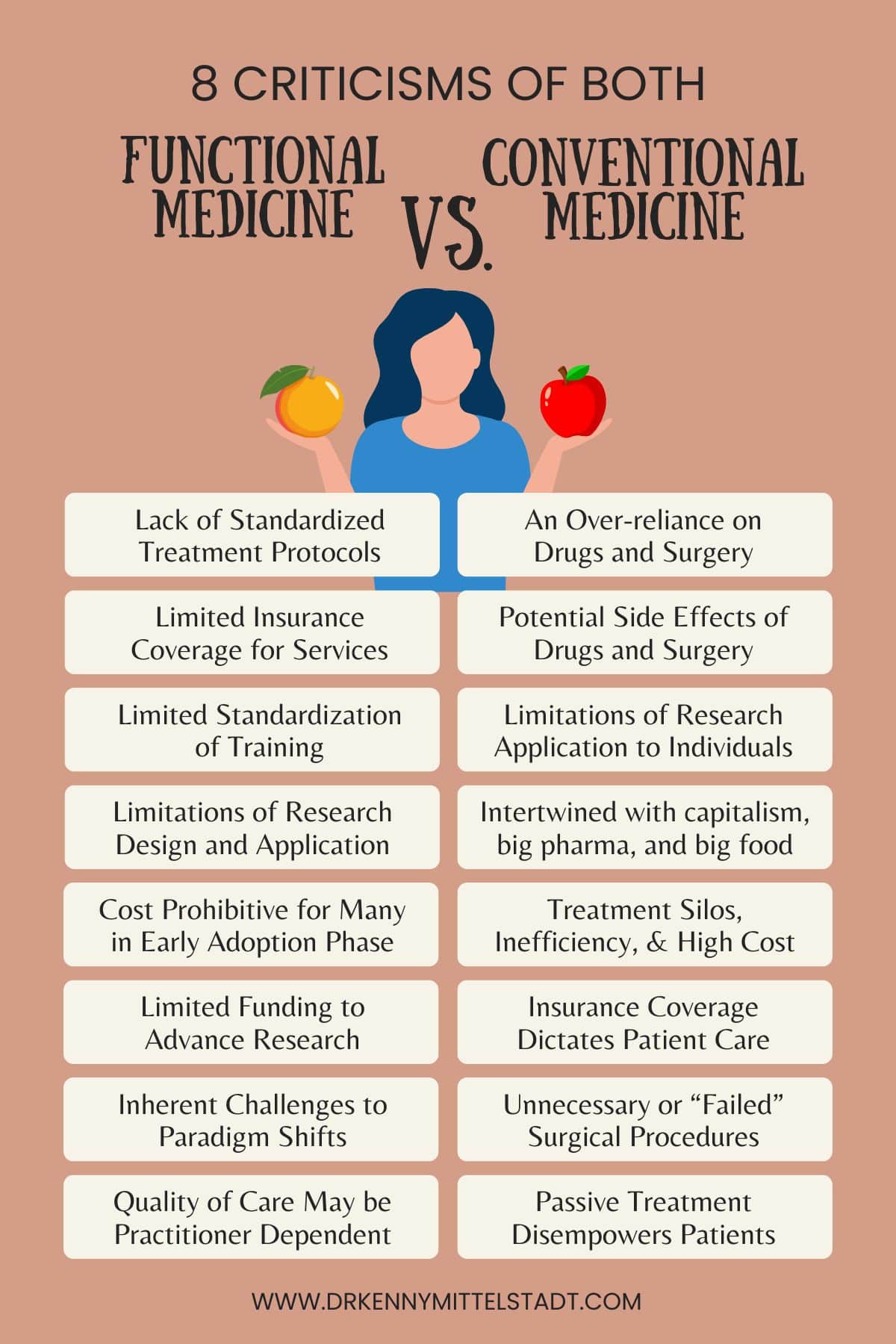Criticisms of Functional vs Conventional Medicine with FAQs & Empowering Takeaways
Wondering which model is right for your health journey? This post explores 8 criticisms of each. Plus FAQs, final thoughts, and co-management tips.
So far, we’ve covered what makes up the paradigms of functional medicine vs. conventional medicine in Part 1 and Part 2 of this blog series.
The last topics to explore lie in the criticisms of each healthcare approach. As with any decision in life, it’s ideal to look at a concept from multiple angles and perspectives.
I hope this discussion provides a balanced view of this discussion on these two main perspectives within healthcare.
Finally, we’ll wrap up the last installment of this blog series with FAQ’s and some key takeaways on how you might choose to use the information presented here!
I wish you a profound sense of empowerment, and I hope you have learned a lot about both paradigms. Let’s continue to deep dive!

Criticisms, Limitations, & Downsides of Both Functional Medicine and Conventional Medicine?
Eight Criticisms of the Functional Medicine Paradigm
1. Lack of Standardized Treatment Protocols
A holistic approach makes it challenging to create standardized protocols. Such a practice would contradict functional medicine’s key underlying theory of holism altogether as we discussed in Part 2.
However, standardized certification and training programs exist that attempt to unify practitioners around key frameworks. Educational programs are designed to offer evidence-based best practices. They are voluntary and often expensive undertakings for aspiring practitioners.
2. Limited Insurance Coverage
In general, insurance coverage does not extend to functional medicine specialty testing and intervention. Though some practitioners do take blended approaches, a majority of them operate cash-based practices or membership-based practices.
This should make sense since functional medicine isn’t born out of the reductionist, randomized, clinical-controlled trial paradigm that conventional medicine and insurance systems operate within.
3. Standardization of Training
The depth of functional medicine training may widely vary practitioner to practitioner. Currently, functional medicine is not governed by a single entity. A practitioner’s scope of practices is the same as their primary license and governed by the licensing boards of each individual practitioner.
However, there are organizations such as the Institute for Functional Medicine, the premier institution for certification and training.
4. Limitations of Research Design and Application
For similar reasons as lack of standardized protocols, the holistic nature of functional medicine doesn’t lend itself to our current clinical research paradigm. Isolating single variables and clinical control trials are in opposition to the undertones of individual complexity.
Any non-reductionist system has unique challenges fitting into the reductionist paradigm of RCT’s. This applies to functional medicine, Chinese medicine, ayurvedic medicine, and other systems-biology approaches to human health and wellness as discussed in Part 2.
5. Cost Prohibitive in the Early Adoption Phase
As with any good or service in the early adoption phase, cost is a limiting factor for many – High costs apply to both functional medicine training for practitioners and patient access to care and treatment.
6. Limited Funding to Advance Functional Medicine Research
Even aside from the RCT challenges, medical research is incredibly expensive. Large clinical trials are commonly sponsored by pharmaceutical companies, insurance companies, and educational institutions.
7. Inherent Challenges to Paradigm Shifts
Any ideology that challenges or detracts from the majority and the norm is laden with inherent challenges. This limits accessibility, education, and buy-in from stakeholders. As with any social or political movement, the early adoption phase may be quite pronounced.
Adopting functional medicine as a mainstream paradigm would involve rethinking major systems of our society – from big pharma, governmental considerations, and education to both practitioners and patients alike.
8. Quality of Care may be Practitioner Dependent in Early Stages
As standardized educational and training program continue to emerge and mature, the efficacy and success of functional medicine treatments may depend on the individual competence of the practitioner.
Eight Criticisms of the Conventional Medicine Paradigm
1. An Over-reliance on Pharmaceuticals and Surgery
Overall, conventional medicine is inherently intertwined with capitalism and the pharmaceutical industry. The latest drug, medical device, or surgical technique drives incredible amounts of business and innovation. This drives best practices and treatment recommendations to patients in the conventional model.
An ever prevalent issue with managing chronic and complex illness is polypharmacy. This is the usage of multiple drugs by a single patient, with sometimes unknown or even hazardous consequences depending on the patient.
2. Potential Side Effects of Drugs and Surgery
Drugs and surgery have potential side effects and complications. These are powerful interventions, but also carry significant risks, some that are known and others unknown. Patient education and understanding around these realities are often downplayed and poorly communicated.
3. Limitations of Research Application to Individuals
RCT’s are excellent at looking at and comparing single interventions and outcomes. Because they control for all other variables, the findings may not apply as cleanly given the complexity of an individual patient and whole populations alike.
Additionally, the language of statistics tends to depersonalize and remove the individual experience from the equation in healthcare.
4. Conventional Medicine is Intertwined with Capitalism, Big Pharma, and the Big Food Industries
I might write an entire blog about this one idea… Conventional medicine as it relates to big pharma, big food, and capitalism is complex and noteworthy. They essentially rely on one another keeping the status quo to gain and profit.
Considering this reality, motivation in the “healthcare industry” may not be a patient’s “healthfulness” as much as it is profit-driven.
5. Siloes, Inefficiency, and High Cost of Care
Unfortunately, many patients experience “being tossed around” between specialists. There is little continuity of care and many feel like practitioners don’t really “know” them. Practicing in specialty silos sometimes oversimplifies the patient’s experience and leads to inefficiencies in care.
Additionally, this drives up the cost of healthcare in the United States. The U.S. already has the highest per capita healthcare expenditures in the world as we saw in Part 1.
6. Insurance Coverage Dictates Patient Care
Insurance companies are also intertwined with capitalism and conventional medicine. These institutions have little to gain from healthfulness and may have complicated, profit-driven motivations as well.
7. Unnecessary or “Failed” Surgical Procedures
Surgery is sometimes pushed and presented to patients before exhausting other conservative efforts. This seems to be especially true in the realm of chronic pain management. For example, it is estimated that 10-46% of lumbar spine surgery patients experience Failed Back Surgery Syndrome (FBSS).
However, integrative protocols such as the CRISP attempt to utilize conservative, evidence-based measures before resorting to surgery.
8. Passive Treatments Disempower Patients
The passive nature of treatment in conventional medicine places patients in a state of disempowerment. Many patients report not fully understanding their care options or their role in their own healthcare journeys.
Choosing the Right Approach for You
What is the “right” intervention for you and your health concerns? Here are a few considerations if you’re trying to decide to seek out functional medicine vs. conventional medicine:
- The Nature of Your Health Condition – Conventional medicine is unbeatable when it comes to the management of acute or emergent conditions (broken bones, trauma, heart attack, etc.) You might consider functional medicine for more chronic, complex conditions or for prevention and health optimization.
- Your Personal Preferences and Values – Do any of the underlying philosophies and principles of functional medicine vs. conventional medicine align most with your own?
- Accessibility of Practitioners Virtually or In Your State – Sometimes accessibility and availability of practitioners is a real issue depending on where in the country or world you live. Check out “find a practitioner” resources through your insurance companies or through the IFM’s Find a Practitioner
- Your Need or Preference for Insurance Coverage of Services – How important is insurance coverage of services for you? Many functional medicine practitioners do not accept insurance. However, some take blended approaches, so don’t give up hope if this is a necessity for you.
- Does it have to be an “either/or” situation? – Maybe you don’t have to choose. Why not consider co-management with both functional medicine and conventional medicine practitioners. Ultimately, you get to decide when it comes to your healthcare!
Frequently Asked Questions (FAQ’s)
Is functional medicine legitimate?
In short, yes, functional medicine is legitimate. First, contemporary research informs its interventions. Additionally, its tenets follow the three prongs of evidence-based medicine: Best available evidence, clinical experience, and patient values and preferences.
Ask about certifications, licensure, and best practices whenever you talk with any of your healthcare practitioners if you have concerns.
What degree does a functional medicine practitioner have?
Functional medicine practitioners may have virtually any advanced, licensed health degree. A pracittioner’s scope of practice does not change with training in functional medicine. Instead, functional medicine offers a framework through which patients are holistically managed.
As such, common degrees and licenses that functional medicine practitioners hold include MD’s, DO’s, DC’s, NP’s, PA’s, ND’s, L.Ac.’s, DDS, PT’s, Mental Health Practitioners, and more!
Can I use both functional medicine and conventional medicine together?
Yes! For starters, a conventional medicine practitioner can practice functional medicine. Additionally, a practitioner from each paradigm can co-manage your healthcare.
Does insurance cover functional medicine services?
Many functional medicine practitioners do not accept insurance. Insurance companies tend to align with the conventional medicine models, and reimbursement is inconsistent depending on the diagnosis and treatment algorithms set forth. Insurance rarely covers functional medicine labs and nutraceuticals.
However, some practitioners take a blended approach and insurance may be applicable for overlapping interventions. For example, some conventional lab work and pharmaceutical interventions may be a part of an individual patient’s diagnostic and treatment plan, and sometimes covered by insurance.
Check with your functional medicine practitioner for more specific information to you.
Are there specific health conditions better suited for one approach over the other?
As I mentioned above, conventional medicine’s strengths lie in its ability to manage acute and emergent conditions. Functional medicine may better address both chronic conditions or complex health situations. Especially in situations with nutritional and lifestyle-related components.
How do I find qualified practitioners in each field?
As we’ve explored, a great place to start is to use a “Find a Practitioner” search bar on a reputable website. I included a link to the database from the Institute for Functional Medicine a few times in this blog.
If there are other organizations you gravitate toward relevant to your condition, check with their databases too!
What are the differences between a naturopath and a functional medicine practitioner?
There is a lot of overlap in the philosophical foundations between functional medicine and naturopathic medicine. Functional medicine attracts many naturopaths because of the overlapping nature of their underlying theories.
We could spend a good amount of time on this topic as we did with conventional medicine, but overall, both include an understanding of holism and prioritization of nutrition and lifestyle interventions.
Naturopathy is a licensed profession in many states with formal education training and pathways to licensure. On the other hand, functional medicine training is added to one’s primary degree. Remember, functional medicine is more of a “lens” through which a practitioner looks.
Conclusion of the Functional Medicine vs. Conventional Medicine Blog Series
To conclude this in depth coverage of functional medicine vs. conventional medicine, I’d like to revisit the key sections of this discussion! Hopefully these three parts guide you well and lead you to deeper understanding!
First, holism guides the practice of functional medicine. It highlights the importance of an individualized understanding of disease and dysfunction with emphasis on the root cause of one’s imbalances. Lifestyle and nutrition are often initial foci of treatment. Additionally, functional medicine prioritizes integrative approaches.
In contrast, reductionism guides the practice of conventional medicine. It relies on identifying symptoms and diagnoses that are measurable and observable. Treatment focuses on managing symptoms and signs with drugs and surgery. Also, the system is built around specialization.
As a society, we have a need now more than ever for empowerment and autonomy of decision making when it comes to our health. The first step is to create understanding, and that’s my primary goal here!
Truly, I hope that you gained some important, empowering insight throughout this discussion! If you would like to learn more about functional medicine, or discuss further with me, feel free to comment below, reach out via social media, or sign up for my mailing list below!
Remember, health is contagious, share the love!
About the Author
Dr. Kenny Mittelstadt is a root-cause health detective and functional medicine practitioner practicing in Texas, California, and Florida. Trained through the Institute for Functional Medicine with dual doctorates earned at highest honors from Southern California University of Health Sciences, he helps patients solve complex health issues naturally using advanced functional lab testing and personalized holistic care instead of conventional medications.


I need a realistic ball park idea of costs Dr Kenny Middlestadt;
Cost of baseline to research my symptoms(I’m aware every person’s different)
Ballpark of various lab work(saliva,hair, blood, etc)
I realize functional methods are EXtremely Expensive because of all variables explained and can go into hundreds of dollars in a blink.
I would appreciate a broad guesstimate of a baseline cost before I proceed, please.
Absolutely, I’m happy to help. I actually sent you a personal email to address your question in more detail, but you and anyone else who cares to see can find our more information about Package pricing on Resonate’s Signature Functional Medicine Package page..
There is a good deal of variability, as you mentioned, but each step is co-created together based on health goals and financial preferences.